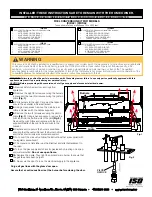
NOTE: DIAGRAMS & ILLUSTRATIONS NOT TO SCALE.
2
TABLE OF CONTENTS
Safety Rules .................................... page 2
Tools and Building Supplies ............ page 2
Precautions ..................................... page 3
Introduction ..................................... page 3
Clearances/Height Requirements ..... page 3
Chimney System ............................. page 3
Assembly Outline ............................. page 4
Location of Fireplace ....................... page 4
Assembly Steps ............................... page 5
Preinstallation Notes ........................ page 5
Clearances ....................................... page 5
Installing the Fireplace ..................... page 5
Fireplace Specifications .................. page 6
Framing Specifications .................... page 7
Installing the Chimney System ........ page 8
Ten Foot Rule Summary .................. page 10
Multiple Terminations ...................... page 11
Chimney Component Calculations ... page 11
Special Offset Instructions ............... page 11
Offset Calculations ........................... page 12
Vertical Elevation Chart ................... page 13
Offset Elevation Chart ..................... page 13
Installing Offsets .............................. page 14
30
°
Offset through Floor/Ceiling ...... page 14
Optional Equipment Considerations . page 14
Combustion Air Kits ........................ page 14
Glass Doors ..................................... page 15
Gas Line Connection ........................ page 15
Vent Free Appliances ....................... page 15
Cold Climate Insulation .................... page 15
Fireplace Finishes ............................ page 15
Mantels and Trim ............................. page 15
Hearth Extensions/Wall Shields ....... page 16
Finish Requirements ........................ page 18
Installation Components .................. page 18
IMPORTANT: PLEASE READ AND
UNDERSTAND THESE RULES TO
FOLLOW FOR SAFETY.
1. Before starting your fireplace installation,
read these installation instructions carefully to
be sure you understand them completely and in
entirety. Failure to follow them could cause a
fireplace malfunction resulting in serious injury
and/or property damage.
The manufacturer is not responsible for any
smoking or related problems that may result
from the lack of adequate combustion air. It is
the responsibility of the builder/contractor to
ensure that adequate combustion air has been
provided for the fireplace.
13. DO NOT use a fireplace insert or any other
products not specified herein by the manufac-
turer for use with this fireplace. All gas log sets
must be operated with the damper clamped
open, including unlisted “vent free” log sets.
Listed “vent-free” log sets may be operated
with the damper closed.
14. "Smoke free” operation is not warranteed
nor are we responsible for inadequate system
draft caused by mechanical systems, general
construction conditions, inadequate chimney
heights, adverse wind conditions and/or un-
usual environmental factors or conditions be-
yond our control.
15. Never, under any circumstances, install a
fireplace, chimney component or any acces-
sories, that has visible or suspected physical
damage as a result of handling or transporta-
tion. These items should be inspected by your
distributor or qualified factory representative
to ensure safe condition. When in doubt, con-
sult your distributor.
16. For additional safety considerations and
complete operating instructions, refer to the
Care and Operation Manual provided with the
fireplace.
TOOLS AND BUILDING SUPPLIES
NORMALLY REQUIRED
Tools should Include:
Phillips screwdriver
Hammer
Saw and/or sabersaw
Level
Measuring tape
Plumb line
Electric drill and bits
Pliers
Square
Building supplies:
Framing materials
Wall finishing materials
Caulking materials (noncombustible)
Fireplace surround and hearth
extension materials (noncombustible)
2. Always check your local building codes. The
installation must comply with all local, regional,
state and national codes and regulations.
3. This fireplace must be installed with Secu-
rity Chimneys FTF10 [10" (250 mm) inside
diameter] Chimney System only. These sys-
tems are intended for use in any application
where a traditional masonry type fireplace
would apply. The chimney system must al-
ways vent to the outside of the building.
4. To ensure a safe fireplace system and to
prevent the build-up of soot and creosote, inspect
and clean the fireplace and chimney prior to use
and periodically during the heating season.
5. Use solid fuel only. DO NOT use chemical
chimney cleaners or flame colorants in your
fireplace.
Never burn treated construction lumber or
scraps. These woods burn excessively hot
and may contain chemicals used to treat
insects and fungus. When burned, these
chemicals can pose a significant hazard.
6. DO NOT use charcoal or coal under any
circumstances.
7. NEVER use gasoline, gasoline-type lantern
fuel, kerosene, charcoal lighter fluid, or similar
liquids to start or “freshen up” a fire in this
fireplace. Keep any flammable liquids at safe
distance from the fireplace.
8. NEVER leave children unattended when
there is a fire burning in the fireplace.
9. Always keep flue damper open when heat is
present in the fireplace.
10. Before servicing, allow the fireplace to
cool. Always shut off any electricity or gas to
the fireplace while working on it. This will
prevent any possible electrical shock or burns.
11. This fireplace is not intended to heat an entire
home or be used as a primary heat source. It is
designed to ensure homeowner comfort by pro-
viding supplemental heat to the room.
12. Always ensure that an adequate supply of
replacement combustion air from the outside
of the house is accessible to the fire to support
normal combustion. Fireplaces consume large
volumes of air during the normal combustion
process. In the event the home is tightly sealed
with modern energy efficient features, the op-
tional combustion air kit may not provide all the
air required to support combustion.



































